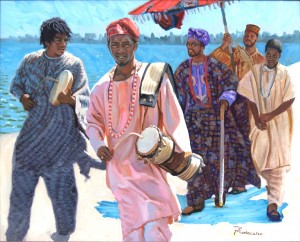
Happy New Year!
Over the years, the Gullahs have attracted many historians, linguists, folklorists, and anthropologists interested in their rich cultural heritage. Many academic books on that subject have been published. The Gullah have also become a symbol of cultural pride for blacks throughout the United States and a subject of general interest in the media. This has given rise to countless newspaper and magazine articles, documentary films, and children’s books on Gullah culture, and to a number of popular novels set in the Gullah region.
Gullah people now organize cultural festivals every year in towns up and down the Low country. Hilton Head Island, for instance, hosts a “Gullah Celebration” in February. It includes “De Aarts ob We People” show; the “Ol’ Fashioned Gullah Breakfast”; “National Freedom Day,” the “Gullah Film Fest”, “A Taste of Gullah” food and entertainment, a “Celebration of Low country Authors and Books,” an “Arts, Crafts & Food Expo,” and “De Gullah Playhouse”. Beaufort hosts the oldest and the largest celebration, “The Original Gullah Festival” in May. The nearby Penn Center on St. Helena Island holds “Heritage Days” in November. Other Gullah festivals are celebrated on James Island, South Carolina and Sapelo Island, Georgia.
But Gullah culture is also being celebrated elsewhere in the United States. The Black Cultural Center at Purdue University in West Lafayette, Indiana conducted a research tour, cultural arts festival, and other related events to showcase the Gullah culture. The Black Cultural Center Library maintains a bibliography of Gullah books and materials, as well.Metro State College in Denver, Colorado recently hosted a conference on Gullah culture, called The Water Brought Us: Gullah History and Culture, which featured a panel of Gullah scholars and cultural activists. These events in Indiana and Colorado are typical of the attention Gullah culture regularly receives throughout the United States.
Gullah culture has proven to be particularly resilient. Gullah traditions are strong not only in the rural areas of the Low country mainland and on the Sea Islands, and among their people in urban areas such as Charleston and Savannah. Gullah people who have left the Low country and moved far away have also preserved traditions, for instance, many Gullahs in New York, who went North in the Great Migration have established their own neighborhood churches in Harlem, Brooklyn, and Queens. Typically they send their children back to rural communities in South Carolina and Georgia during the summer months to live with grandparents, uncles and aunts. Gullah people living in New York also frequently return to the Low country to retire. Second- and third-generation Gullah in New York often maintain many of their traditional customs and sometimes still speak the Gullah language.

